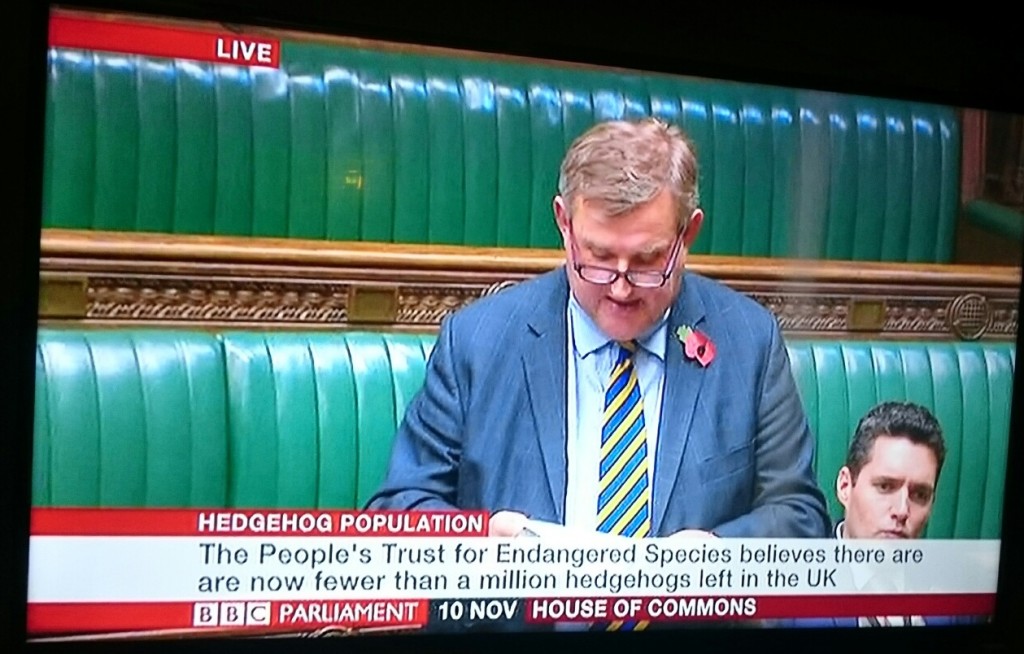Our response to the Government’s comments on hedgehog petition
Defra response (stimulated by the 10,000 signature milestone) in italics; PTES & BHPS response in bold
100,000 signatures by 12th August will trigger a debate in Parliament
The Government is concerned about the decline of the hedgehog. Whilst the reasons for the decline in numbers of this emblematic species are complex, we support efforts to make our gardens more hedgehog friendly and more friendly to wildlife generally and pollinators specifically.
To encourage the involvement of local communities we recently published advice for homeowners in the form of five simple steps to make gardens more hedgehog friendly. This advice can be accessed at: www.gov.uk/government/news/five-simple-steps-to-transform-gardens-in-to-hedgehog-havens
We are impressed by the good work of the British Hedgehog Preservation Society and the People’s Trust for Endangered Species in undertaking surveys to establish the facts and engaging the public, and support the majority of their 10 year strategy for the protection of hedgehogs. The Taxon Group, which is being led by Natural England, is also proposing a number of actions that address some of the objectives of the 10 year Strategy.
PTES and BHPS welcome acknowledgment from Defra recognising our hedgehog campaign and the ten year conservation strategy. We would encourage an open dialogue with the Mammal Taxon Group at Natural England to discuss how we can work cooperatively.
Hedgehogs are protected by the Wildlife and Countryside Act 1981 from being killed using prohibited methods such as a crossbows, traps and snares. However, further protection of hedgehogs by adding them to Schedule 5 will not support the species and may have unintended consequences because:
From PTES/BHPS’ perspective the main benefit of moving hedgehogs onto schedule 5 would be the possibility for formalising a legal requirement for developers to survey for hedgehogs in new developments and, importantly, to put in place mitigation steps (e.g. ‘hedgehog highways’ between gardens).
- the legislation makes it an offence to intentionally kill, take and injure and we have no evidence that this is currently an issue; BHPS does receive reports of healthy hedgehog being taken from the wild, and sometimes killed, so any additional protection from this would be beneficial.
- protecting such a generalist habitat from destruction or disturbance could have the unintended consequence of making it a criminal offence to tend gardens; We do not think that such a move would criminalise garden activities, as accidental disturbance of hedgehogs would not be a crime under shedule 5.
- it may deter the maintenance and creation of habitat for hedgehogs if there will be a restriction on land use as a result Greater legal protection for hedgehogs is also unlikely to impede land use, as hedgehogs are generalists and thus hedgehog-specific habitat creation is not necessary.
Since 2010 we have overseen work to create and restore over 100,000 hectares of priority habitat. Frontline programmes such as our agri-environment schemes have already restored or planted 30,000 kilometres of hedgerows. The new £900 million Countryside Stewardship scheme which started this year will further add to this valuable work by helping farmers, foresters and other land managers play a pivotal role in protection our wildlife and the countryside in general. In addition, the hedgerows and boundaries capital grants (part of Countryside Stewardship) announced on 1 February will also have a valuable part to play.
We are developing an ambitious 25 Year plan to protect and enhance our environment. It will move us to a more integrated and effective approach to managing our environment, placing local people and places at the heart of environmental decision making. This new approach will help equip people with the knowledge and power they need to take effective action on local environmental priorities, helping reverse the decline of iconic species like hedgehogs as part of this joined up approach.
We look forward to the launch of the Defra 25 year plan, and ask government to look for areas where the ten year hedgehog strategy, Hedgehog Street and other PTES and BHPS initiatives can be integrated into this. Both BHPS and PTES welcome any opportunity to work collaboratively with government for hedgehogs, particularly on the goal of ensuring that hedgehogs can move freely through the gardens and greenspace in every new development in Britain. Achieving such a goal would benefit countless other species too.
We will continue to support Oliver Colvile’s petition, for the reasons stated above and to ensure that the plight of the hedgehog is not ignored.

